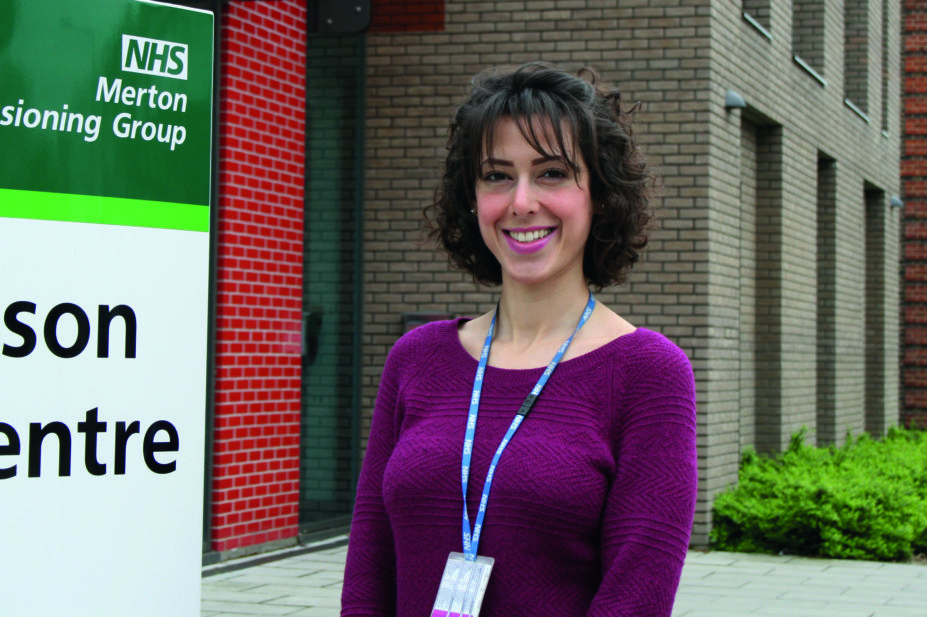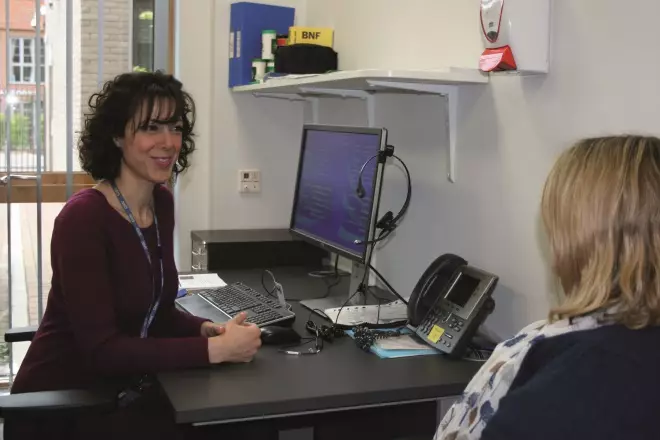
MAG / The Pharmaceutical Journal
Dr Rania Hallaq is a holistic assessment and rapid investigation (HARI) clinical pharmacist for Central London Community Healthcare NHS Trust.
What is your current role and how did you get there?
I am currently the clinical pharmacist in the holistic assessment and rapid investigation (HARI) team for Central London Community Healthcare NHS Trust. The HARI is a multidisciplinary team that assesses, investigates and treats referred patients with multiple complex medical and rehabilitation needs.
My career journey has been slightly convoluted. After completing my preregistration year in a hospital, I undertook a PhD at King’s College London in neuroscience. Concerned with preserving my hospital pharmacy skills after so much time out, I undertook a rotation post in a London hospital straight after completing my PhD. This allowed me to develop my clinical skills further, but I felt restricted by the job. I resigned and decided to work as a locum, which I did for many years across more than ten different NHS hospital trusts. I became very clinically experienced, saw the HARI clinical pharmacist role at Central London Community Healthcare NHS Trust and applied.
Being a locum has provided me with varied exposure to medical practices, cases, and ways of managing patients
What do you do on a typical day at work?
The day usually begins with a meeting with representative members of the team to discuss patients due to be seen that day, who then arrive by transport to begin the clinic lists. Daily clinics with the two advanced nurse practitioners (ANP), a consultant clinic, the pharmacist clinic — which I lead — and group physiotherapy sessions run in parallel.
I may be requested to see patients together with the consultant or with an ANP, depending on the reason for the patient’s referral. The patients I see in clinic have medication-related problems, which can be diverse in nature. Patients are taken home by transport before lunchtime, and then we run clinics throughout the afternoon. I usually spend the time between patients chasing test results, writing clinic letters, liaising with specialists and discussing cases of concern with the consultants.

Source: MAG / The Pharmaceutical Journal
Between seeing patients during clinics each afternoon, Rania Hallaq chases test results, writes clinic letters, and liaises with specialists and consultants
Which of your skills from previous roles have helped prepare you for this role, and what new skills have you learnt on the job?
Being a locum has provided me with varied exposure to medical practices, cases, and ways of managing patients. I have insisted on joining daily ward rounds, being part of the discussion with doctors related to treatments and questioned reasons for prescribing unindicated medications. It was important to me then, as it is now, to understand what was happening to the patient and why.
My role has provided an exponential learning curve in the diagnosis and management of complicated conditions
I enjoyed being integral to the team and the variety of patient interactions helped me establish a consultation style that builds rapport with the patient. However, this role has allowed me to refine the consulting process, because being in clinic with ANPs and consultants and observing their daily practice has allowed me to apply my experience in a more finely tuned way.
It has also provided an exponential learning curve in the diagnosis and management of complicated conditions, professional responsibility and accountability, liaising with hospital specialists, ordering tests and investigations, interpretation and documentation.
What is the most challenging part of your current role?
A lot of problem-solving skills are required, which is what keeps me challenged. I see patients with a diverse array of medication-related problems, which may range from side effects, pain management while being on multiple pain medications, labile blood pressures, to the failure of first, second and third-line options, cognitive deficits and patients under the care of multiple specialists, among others.
This role is by far the most clinically demanding role I have held
Apart from the pressure of solving these problems if possible, it can be challenging to determine the correct diagnosis and select the most appropriate activities that could aid with management. I may also need to undertake a full physical assessment or request bloods tests, x-rays, Doppler’s, echocardiograms and 24-hour tapes, in order to identify the underlying problems. Even though I can refer the patient to see the consultant or an ANP, I may be the only person to see the patient in the team, and I need to assess, investigate, manage and follow up with the patient, which can be challenging.
What tips would you give another pharmacist considering similar roles?
They would need to be an experienced pharmacist who is interested in the medical management of patients and working as part of a multidisciplinary team. Having a hospital pharmacy background would be beneficial and I would advise pharmacists to be involved in multidisciplinary team meetings, ward rounds, consultant reviews and to take an interest in the whole patient journey. Working in outpatient clinics will also provide good experience.
Pharmacists should be prepared to seek every opportunity to learn, attend conferences and seminars every year. Volunteering to take teaching sessions and workshops and ensuring they keep up to date with developments across broad areas of practice is also beneficial. Undertaking the independent prescribing programme and performing administrative and letter writing tasks would all be essential.
What makes your current role different from other pharmacy roles you have held?
This role is by far the most clinically demanding role I have held. Although I am applying many, if not all, of my pharmacy-related skills such as identifying side effects, checking compliance, and counselling patients, I am also acquiring medically related skills such as physical assessments, interpretations of x-rays and electrocardiograms (ECGs), all of which help decipher the suitability of medicines in patient management.
My role has also challenged my perception of clinical pharmacists, not only in terms of remit, but how we possess important and key skills that can be developed, if we were given even closer links with the medical profession.


